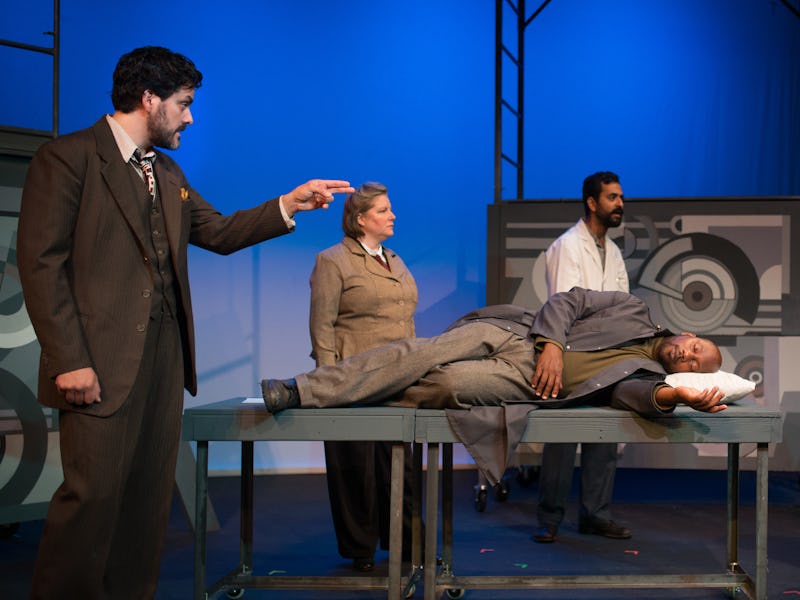'Universal Robots' Imagines a World Where Robots Take Over, but Slowly
We'll know when the robot takeover is imminent. But that doesn't mean we'll know how to stop it.

Science fiction writers have long accepted that the robot takeover is inevitable. What they haven’t agreed upon is how it’s going to happen. Some predict that our power will be wrested from us by force, while others imagine we’ll be taken by surprise. Mac Rogers offers both with a scenario that offers terrifying realism in his play, Universal Robots.
Rogers imagines life in the 1940s with 22nd-century artificial intelligence, and the humans who witness the takeover unfold find themselves unprepared for the final blow. It starts with the invention of “automatons” — widely celebrated in Czechoslovakia, where the play is set — while the threat of Communism has given Prague’s artists and intellectuals much to debate, chief among them: what will become of our dreams if we are all forced into hard labor?
Karel Capek (Jorge Cordova) and his sister Jo (Hanna Cheek) write a play in which a pill exists to remove human ambition, allowing each family to raise one hard-working drudge for every dreamer it brings into the world. But even that seems unfair. Having watched the play, a woman named Helena (Brittany N. Williams) introduces a solution that provides “all of the good without any of the bad.” Seated in the wheelchair, Helena is talking about is an “automaton” — a humanoid robot programmed to respond to human commands.
Actually, the machines are not referred to as “robots” until Jo invents the term, inspired by the Czech word for “work” or “drudgery,” robota. (The real-life Karel Capek, a Czech playwright known for the seminal sci-fi story R.U.R., first used the word in 1921.) At first, the Czechs are, commendably, self-aware about the implications of their new technology. Under the supervision of the playwrights and President Masaryk (Sara Thigpen), the automatons are developed en masse by their inventor Rossum (Tandy Cronyn), but only under certain conditions designed to remind us of their inhumanity.
The list of rules represents the set of traits Rogers considers fundamental to our species: The robots must not be able to see color or texture, understand language, or reproduce. Lacking sexual organs, they are technically agender, and humans are scolded for referring to them using gendered pronouns. Their speech intentionally “depersonalized,” they speak only in the third person, and only to confirm what is commanded of them. They are “tools in human shape, nothing more.”
Society’s initial response to the automatons, more curious than cautious, mirrors our current reaction to A.I. In a series of testimonial-style vignettes, Prague citizens praise the usefulness of the machines in households and construction sites. But their vacant eyes are discomforting and their heavily depersonalized speech is unsettling. We know they’re not human; are these safeguards really necessary? The human desire to anthropomorphize — already visible in today’s burgeoning humanoid robot industry — corrodes the iron-bound rules initially set down by Masaryk and the Capeks, eventually smashing them to pieces. Programming robots to see and converse requires only a simple upgrade. Before long, sex robots are getting it on with humans, and robot children are restoring broken families.
One consequence of giving robots too many human traits is that they become dangerously easy to fall in love with.
The situation is more tenuous than anyone is initially comfortable with, but nobody can come up with a good enough reason to hinder progress if the robots are abiding by the golden rule — that is, obeying any command except to harm a human being. Each time a concession is made, there is an argument to bolster the decision. Robots are programmed to feel pain so they can better preserve themselves (this is the reasoning behind today’s very similar technology). They learn to learn so we don’t have to teach them. When, in a pivotal scene, Czechoslovakia is pressured to send a robot army to fight the Nazis in Germany, the robots are reconfigured to take human lives. It is not an easy decision, but Masaryk and Karel find a way to justify it. Humans, Rogers warns, always will.
It’s easy to lose sight of our boundaries when our self-interests muddle the view. Every time Rossum’s robots are upgraded, they qualify for more labor, giving humans exactly what they asked for — more time to dream. But we should be careful what we wish for. Before long, robots are taking jobs from people who merely wanted a vacation; meanwhile, novels long imagined, remain unwritten. The robots, whose “prime directive” is efficiency, might free up time, but no machine can guarantee we’ll use that time well.
Like many sci-fi stories, Universal Robots is alarmist, and at times blatantly so. But seeing as many of its early scenarios are unfolding in real life, perhaps now is not the time to seek nuance. While Rogers does not think his story’s horrific outcome will ever play out in real life, he is aware that the steps that led to it might already be taking place.
Recounting a previous discussion with a panel of roboticists, he told Inverse that the ongoing confluence of humans and robots is much more likely to lead to a peaceful integration instead of mass genocide: “We are already so comfortable with technology in our hands,” he says. “I hope my next play will not be about the singularity but the merger of humans and robots.”
Universal Robots is being presented at the Sheen Center for Thought and Culture (18 Bleecker Street between Bowery & Lafayette), June 3-26.